北师大版高二英语选修六Unit 16 Stories Culture Corner课件(内嵌视频45张ppt)
文档属性
| 名称 | 北师大版高二英语选修六Unit 16 Stories Culture Corner课件(内嵌视频45张ppt) | 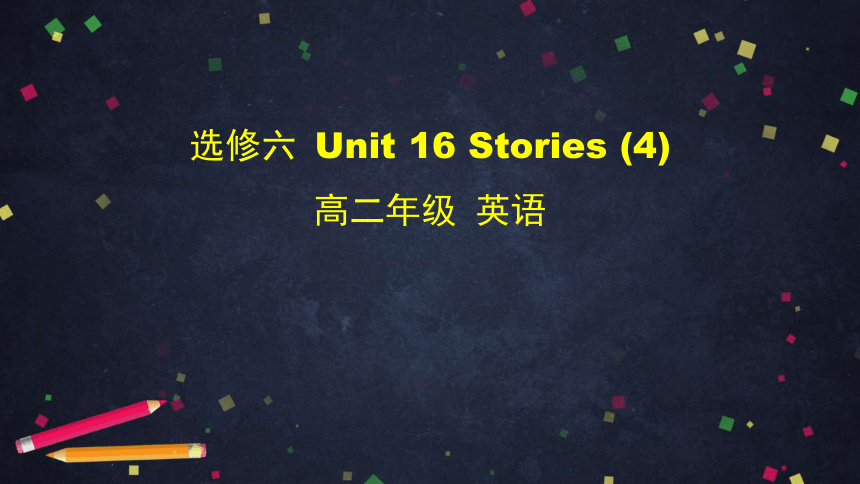 | |
| 格式 | zip | ||
| 文件大小 | 233.8MB | ||
| 资源类型 | 教案 | ||
| 版本资源 | 北师大版 | ||
| 科目 | 英语 | ||
| 更新时间 | 2020-05-01 15:40:33 | ||
图片预览

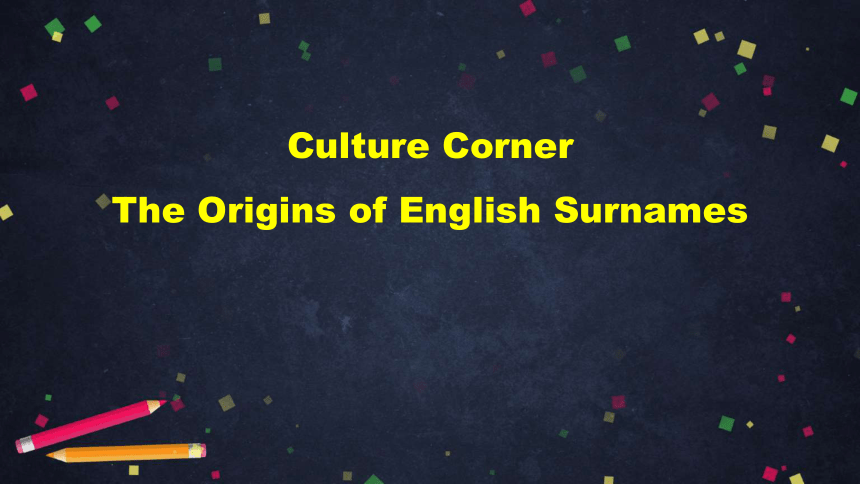
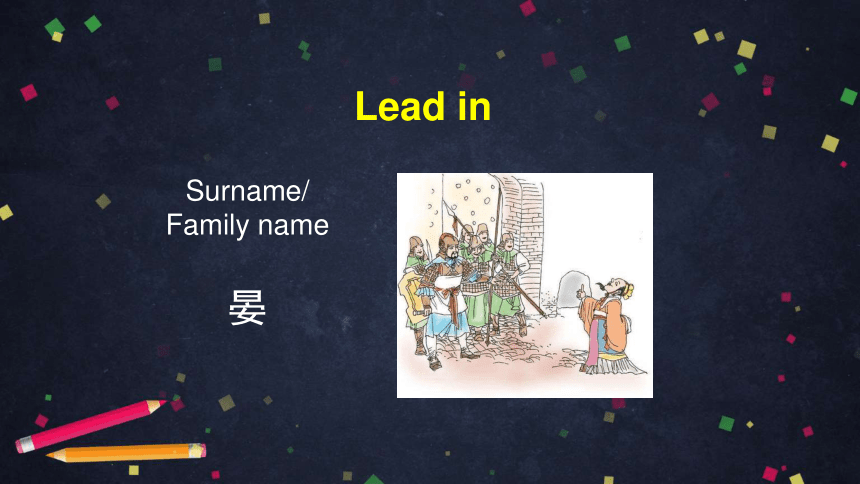
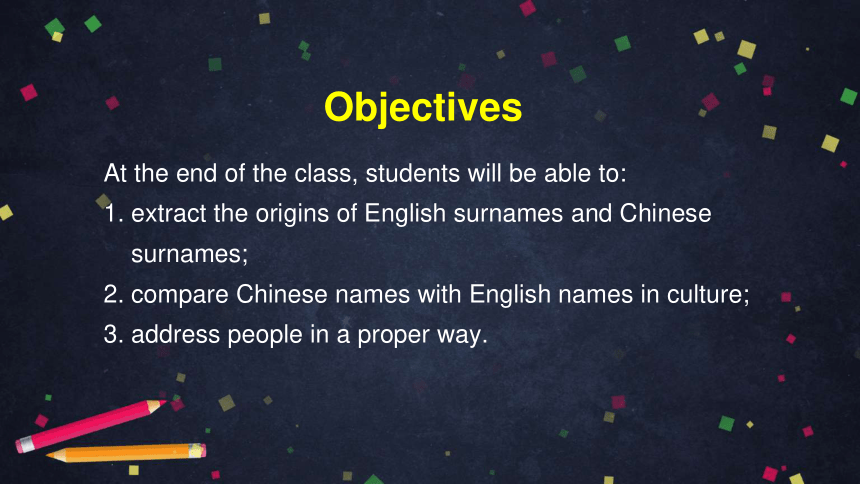
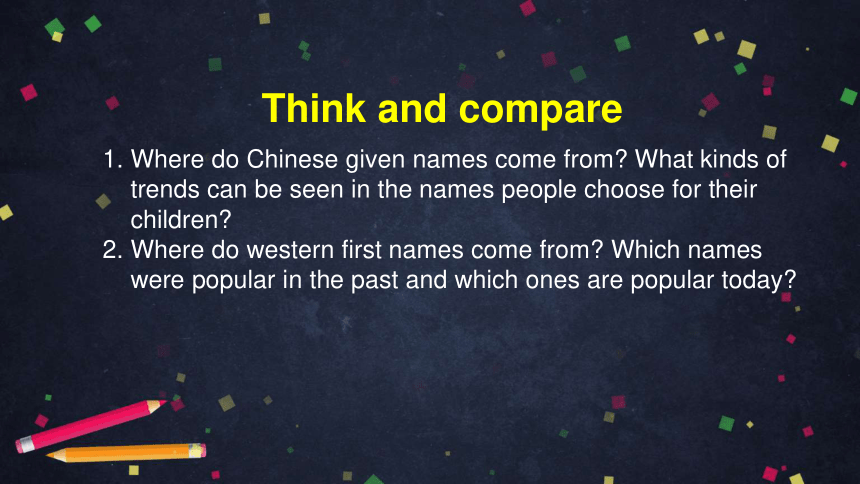
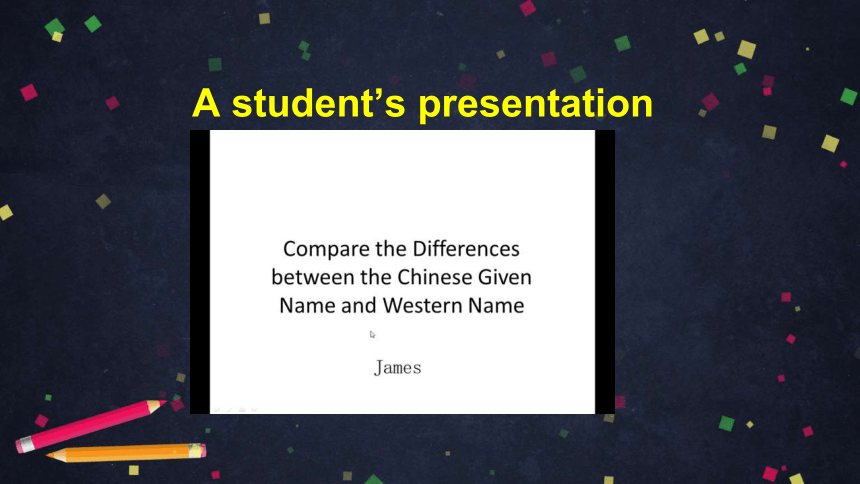
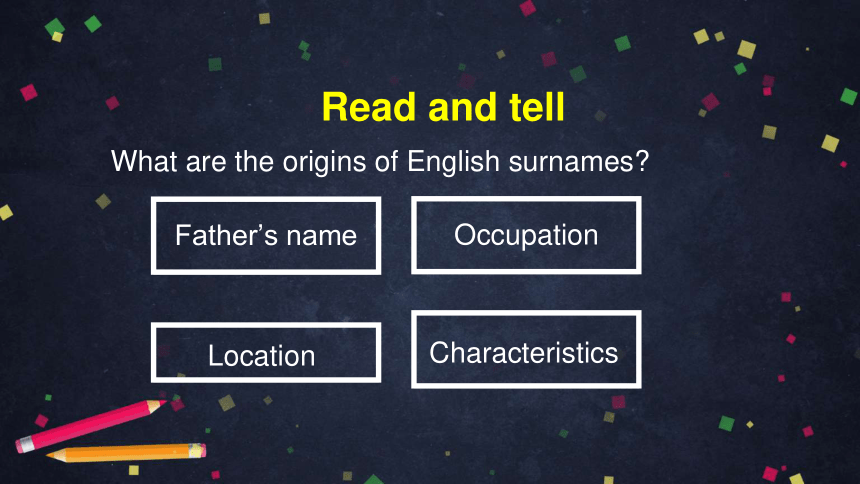

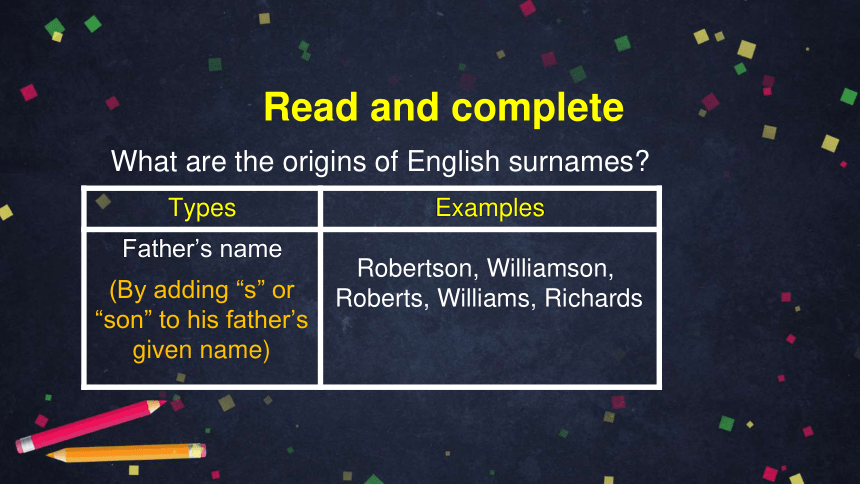

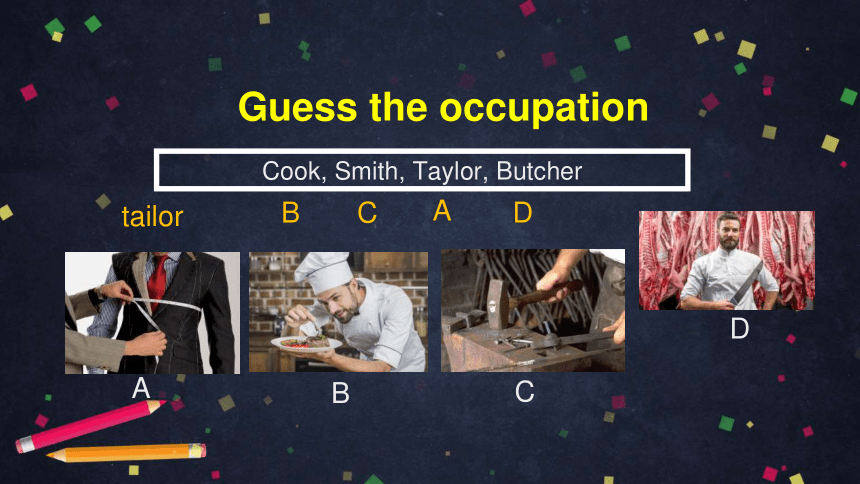
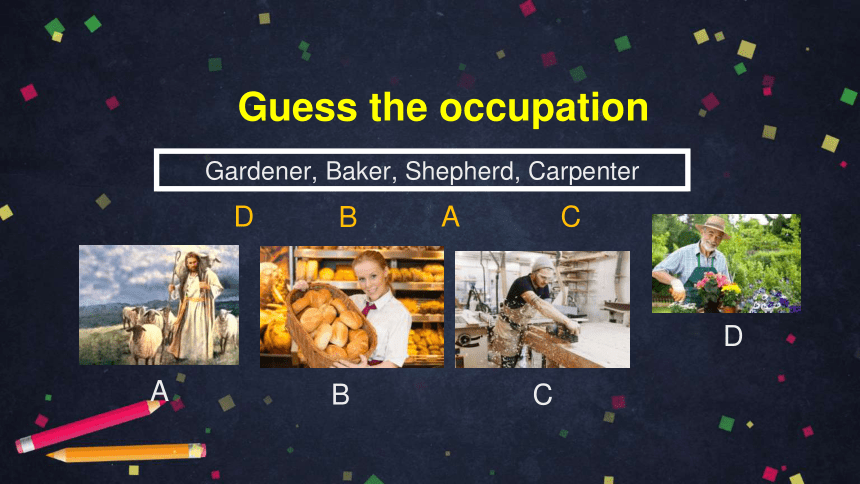
文档简介
课件45张PPT。选修六 Unit 16 Stories (4)
高二年级 英语 Culture Corner
The Origins of English SurnamesLead in晏Surname/ Family nameObjectivesAt the end of the class, students will be able to:
1. extract the origins of English surnames and Chinese
surnames;
2. compare Chinese names with English names in culture;
3. address people in a proper way.
Think and compare1. Where do Chinese given names come from? What kinds of
trends can be seen in the names people choose for their
children?
2. Where do western first names come from? Which names
were popular in the past and which ones are popular today?A student’s presentationRead and tell
What are the origins of English surnames?Father’s nameOccupationLocationCharacteristicsRead and complete
What are the origins of English surnames?Read and complete
What are the origins of English surnames?Robertson, Williamson,
Roberts, Williams, Richards(By adding “s” or “son” to his father’s given name)Read and complete
What are the origins of English surnames?Cook, Smith, Gardener, Baker, Shepherd, Taylor, Butcher, Carpenter(job)Guess the occupation
Cook, Smith, Taylor, ButcherABtailorDCBCADGuess the occupation
Gardener, Baker, Shepherd, CarpenterDDBACBACRead and complete
What are the origins of English surnames?Hill, Field, Wood,
Green, Brown(village,
a physical feature)Read and complete
What are the origins of English surnames?Short, Little, Tall, Long
Stout, White, Red(unusual physical characteristics)Classify
Watson, King, Davis, Potter, Swift, Sawyer, Stone, Carter, Oxford, Jones, Fisher, Edison, Young, Orwell, Longman, BushClassify
Watson, King, Davis, Potter, Swift, Sawyer, Stone, Carter, Oxford, Jones, Fisher, Edison, Young, Orwell, Longman, BushWatson, Davis, Edison, JonesWalter David/DavyEde JohnClassify
Watson, King, Davis, Potter, Swift, Sawyer, Stone, Carter, Oxford, Jones, Fisher, Edison, Young, Orwell, Longman, BushPotter, Sawyer, Fisher, Carter陶工锯木工渔夫 马车夫Classify
Watson, King, Davis, Potter, Swift, Sawyer, Stone, Carter, Oxford, Jones, Fisher, Edison, Young, Orwell, Longman, Bush riverOxfordshire
牛津郡Orwell, Stone, Bush, OxfordClassify
Watson, King, Davis, Potter, Swift, Sawyer, Stone, Carter, Oxford, Jones, Fisher, Edison, Young, Orwell, Longman, BushKing, Swift, Young, LongmanarrogantRead and answer
When did people in England first start using
surnames?
2. Why did people start using surnames?Read and answer
When did people in England first start using
surnames?
In the 11th century when the French invaded England.Norman conquest in 1066The growth of populationRead and answer
2. Why did people start using surnames?
To distinguish themselves from each other. There were many people who shared the same given names.Thomas the BakerThomas BakerConnect and think
1. What do you know about Chinese surnames?
2. What are the origins of Chinese surnames?Read and complete
What are the origins of Chinese surnames?Read and complete
What are the origins of Chinese surnames?Read and complete
What are the origins of Chinese surnames?Compare
1. What do Chinese surnames and English surnames
have in common?
2. What are the differences?Compare
1. What do Chinese surnames and English surnames
have in common?
Some Chinese surnames and English surnames have the same origins, such as occupation and place name.
The Chinese and the British both inherit the surnames from their fathers.
Compare
2. What are the differences?
The Chinese surname carries?the history and the honor of the family and it was considered as a symbol of the social positioning?of the family and the pride.
While English surnames serve more as the connection between family members and distinction from other people.Compare
2. What are the differences?
English women usually take their husbands’ surnames after marriage while most Chinese women don’t.Tell true or false
1. Zhao is the most common surname in China as it ranks first
in Baijiaxing.
2. It’s very common in Britain to name a child directly after a
family member. It’s the same in China.
3. In China, every child recorded into the family records in each
generation would share an identical name character.
Tell true or false
4. Kids in Britain can call their parents by the given name, but in
China it’s not allowed.
5. In Britain, you can address your teacher as “teacher”.
Tell true or false
1. Zhao is the most common surname in China as it ranks first
in Baijiaxing.
The three most common surnames in China are ?Li,?Wang?and?Zhang, which make up 7.9%, 7.4% and 7.1% of the population respectively.
FalseTell true or false
2. It’s very common in Britain to name a child directly after a
family member. It’s the same in China.
In Britain you may name a child after a family member, because he/she is very close to you and has a positive influence on you.
However, in China it is very rare. If that happens, people might inappropriately use the personal names of senior ones.FalseTell true or false
3. In China, every child recorded into the family records in each
generation would share an identical name character.
TrueGeneration name立显荣朝士,文方运际祥。祖恩贻泽远,
世代永承昌。Generation poemTell true or false
4. Kids in America can call their parents by the given name,
but in China it’s not allowed.
It’s impolite to call parents by the given names in both America and China.
In America, they address their siblings by their given names. But in China, you should address your elder sister or brother as “big sister” or “big brother” to show respect.FalseTell true or false
5. In Britain, you can address your teacher as “teacher”.
You should address your teacher as Mr. , Mrs. or Ms..
Teacher is not a title.
The best way is to follow suit.
You can also ask, “How can I call you?”FalseView and learn
How do you address people in English in a proper way?Finish the quiz
1. It is 7:00 in the evening. How would you greet a policewoman
whose name you do not know?
A. Good evening, officer.
B. Good evening, policewoman.
C. Good evening, lady.
AFinish the quiz
2. You work at the front desk of a fancy hotel. A man in a suit
approaches you, looking confused. What could you say?
A. May I help you, buddy?
B. May I help you, sir?
C. May I help you, man?BFinish the quiz
3. You are at the airport to meet Mr. Dan Brown. You have
never met before, but you have seen his picture. You see
someone who you think is the right person. What do you say
to him?
A. Excuse me, are you Dan? Dan Brown?
B. Excuse me, are you Mr. Brown? Mr. Dan Brown?BFinish the quiz
4. What would you call your colleague, Ms. Karen Williams?
She is also a good friend of yours.
A. Karen
B. Ms. Williams
C. Madam
D. DudeAFinish the quiz
5. The term “guys” can be used informally, to address a group
of males and females.
A. True
B. FalseAHomeworkDo a research about how to address people in China in a proper way and write a report about it.
1. What titles are often used to address people?
2. How do we address people differently in different situations (formal or
informal)?
3. What do Chinese people and western people have in common in
addressing people? How about differences?
Respect different cultures.
Understand and inherit Chinese traditional culture. Sum-up
1. extract the origins of English surnames and Chinese
surnames;
2. compare Chinese names with English names in culture;
3. address people in a proper way.
Think and compare1. Where do Chinese given names come from? What kinds of
trends can be seen in the names people choose for their
children?
2. Where do western first names come from? Which names
were popular in the past and which ones are popular today?A student’s presentationRead and tell
What are the origins of English surnames?Father’s nameOccupationLocationCharacteristicsRead and complete
What are the origins of English surnames?Read and complete
What are the origins of English surnames?Robertson, Williamson,
Roberts, Williams, Richards(By adding “s” or “son” to his father’s given name)Read and complete
What are the origins of English surnames?Cook, Smith, Gardener, Baker, Shepherd, Taylor, Butcher, Carpenter(job)Guess the occupation
Cook, Smith, Taylor, ButcherABtailorDCBCADGuess the occupation
Gardener, Baker, Shepherd, CarpenterDDBACBACRead and complete
What are the origins of English surnames?Hill, Field, Wood,
Green, Brown(village,
a physical feature)Read and complete
What are the origins of English surnames?Short, Little, Tall, Long
Stout, White, Red(unusual physical characteristics)Classify
Watson, King, Davis, Potter, Swift, Sawyer, Stone, Carter, Oxford, Jones, Fisher, Edison, Young, Orwell, Longman, BushClassify
Watson, King, Davis, Potter, Swift, Sawyer, Stone, Carter, Oxford, Jones, Fisher, Edison, Young, Orwell, Longman, BushWatson, Davis, Edison, JonesWalter David/DavyEde JohnClassify
Watson, King, Davis, Potter, Swift, Sawyer, Stone, Carter, Oxford, Jones, Fisher, Edison, Young, Orwell, Longman, BushPotter, Sawyer, Fisher, Carter陶工锯木工渔夫 马车夫Classify
Watson, King, Davis, Potter, Swift, Sawyer, Stone, Carter, Oxford, Jones, Fisher, Edison, Young, Orwell, Longman, Bush riverOxfordshire
牛津郡Orwell, Stone, Bush, OxfordClassify
Watson, King, Davis, Potter, Swift, Sawyer, Stone, Carter, Oxford, Jones, Fisher, Edison, Young, Orwell, Longman, BushKing, Swift, Young, LongmanarrogantRead and answer
When did people in England first start using
surnames?
2. Why did people start using surnames?Read and answer
When did people in England first start using
surnames?
In the 11th century when the French invaded England.Norman conquest in 1066The growth of populationRead and answer
2. Why did people start using surnames?
To distinguish themselves from each other. There were many people who shared the same given names.Thomas the BakerThomas BakerConnect and think
1. What do you know about Chinese surnames?
2. What are the origins of Chinese surnames?Read and complete
What are the origins of Chinese surnames?Read and complete
What are the origins of Chinese surnames?Read and complete
What are the origins of Chinese surnames?Compare
1. What do Chinese surnames and English surnames
have in common?
2. What are the differences?Compare
1. What do Chinese surnames and English surnames
have in common?
Some Chinese surnames and English surnames have the same origins, such as occupation and place name.
The Chinese and the British both inherit the surnames from their fathers.
Compare
2. What are the differences?
The Chinese surname carries?the history and the honor of the family and it was considered as a symbol of the social positioning?of the family and the pride.
While English surnames serve more as the connection between family members and distinction from other people.Compare
2. What are the differences?
English women usually take their husbands’ surnames after marriage while most Chinese women don’t.Tell true or false
1. Zhao is the most common surname in China as it ranks first
in Baijiaxing.
2. It’s very common in Britain to name a child directly after a
family member. It’s the same in China.
3. In China, every child recorded into the family records in each
generation would share an identical name character.
Tell true or false
4. Kids in Britain can call their parents by the given name, but in
China it’s not allowed.
5. In Britain, you can address your teacher as “teacher”.
Tell true or false
1. Zhao is the most common surname in China as it ranks first
in Baijiaxing.
The three most common surnames in China are ?Li,?Wang?and?Zhang, which make up 7.9%, 7.4% and 7.1% of the population respectively.
FalseTell true or false
2. It’s very common in Britain to name a child directly after a
family member. It’s the same in China.
In Britain you may name a child after a family member, because he/she is very close to you and has a positive influence on you.
However, in China it is very rare. If that happens, people might inappropriately use the personal names of senior ones.FalseTell true or false
3. In China, every child recorded into the family records in each
generation would share an identical name character.
TrueGeneration name立显荣朝士,文方运际祥。祖恩贻泽远,
世代永承昌。Generation poemTell true or false
4. Kids in America can call their parents by the given name,
but in China it’s not allowed.
It’s impolite to call parents by the given names in both America and China.
In America, they address their siblings by their given names. But in China, you should address your elder sister or brother as “big sister” or “big brother” to show respect.FalseTell true or false
5. In Britain, you can address your teacher as “teacher”.
You should address your teacher as Mr. , Mrs. or Ms..
Teacher is not a title.
The best way is to follow suit.
You can also ask, “How can I call you?”FalseView and learn
How do you address people in English in a proper way?Finish the quiz
1. It is 7:00 in the evening. How would you greet a policewoman
whose name you do not know?
A. Good evening, officer.
B. Good evening, policewoman.
C. Good evening, lady.
AFinish the quiz
2. You work at the front desk of a fancy hotel. A man in a suit
approaches you, looking confused. What could you say?
A. May I help you, buddy?
B. May I help you, sir?
C. May I help you, man?BFinish the quiz
3. You are at the airport to meet Mr. Dan Brown. You have
never met before, but you have seen his picture. You see
someone who you think is the right person. What do you say
to him?
A. Excuse me, are you Dan? Dan Brown?
B. Excuse me, are you Mr. Brown? Mr. Dan Brown?BFinish the quiz
4. What would you call your colleague, Ms. Karen Williams?
She is also a good friend of yours.
A. Karen
B. Ms. Williams
C. Madam
D. DudeAFinish the quiz
5. The term “guys” can be used informally, to address a group
of males and females.
A. True
B. FalseAHomeworkDo a research about how to address people in China in a proper way and write a report about it.
1. What titles are often used to address people?
2. How do we address people differently in different situations (formal or
informal)?
3. What do Chinese people and western people have in common in
addressing people? How about differences?
Respect different cultures.
Understand and inherit Chinese traditional culture. Sum-up
